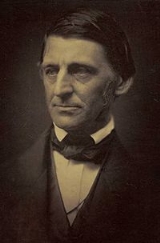
, who led the Transcendentalist
movement of the mid-19th century. He was seen as a champion of individualism
and a prescient critic of the countervailing pressures of society, and he disseminated his thoughts through dozens of published essays and more than 1,500 public lectures across the United States.
Emerson gradually moved away from the religious and social beliefs of his contemporaries, formulating and expressing the philosophy of Transcendentalism in his 1836 essay, Nature.
The sublime is excited in me by the great stoical doctrine, Obey thyself.![]()
The man who renounces himself, comes to himself.![]()
None believeth in the soul of man, but only in some man or person old and departed.![]()
The imitator dooms himself to hopeless mediocrity. The inventor did it because it was natural to him, and so in him it has a charm. In the imitator something else is natural, and he bereaves himself of his own beauty, to come short of another man's.![]()
I fancy I need more than another to speak (rather than write), with such a formidable tendency to the lapidary style. I build my house of boulders.![]()
Literature is the effort of man to indemnify himself for the wrongs of his condition.![]()

